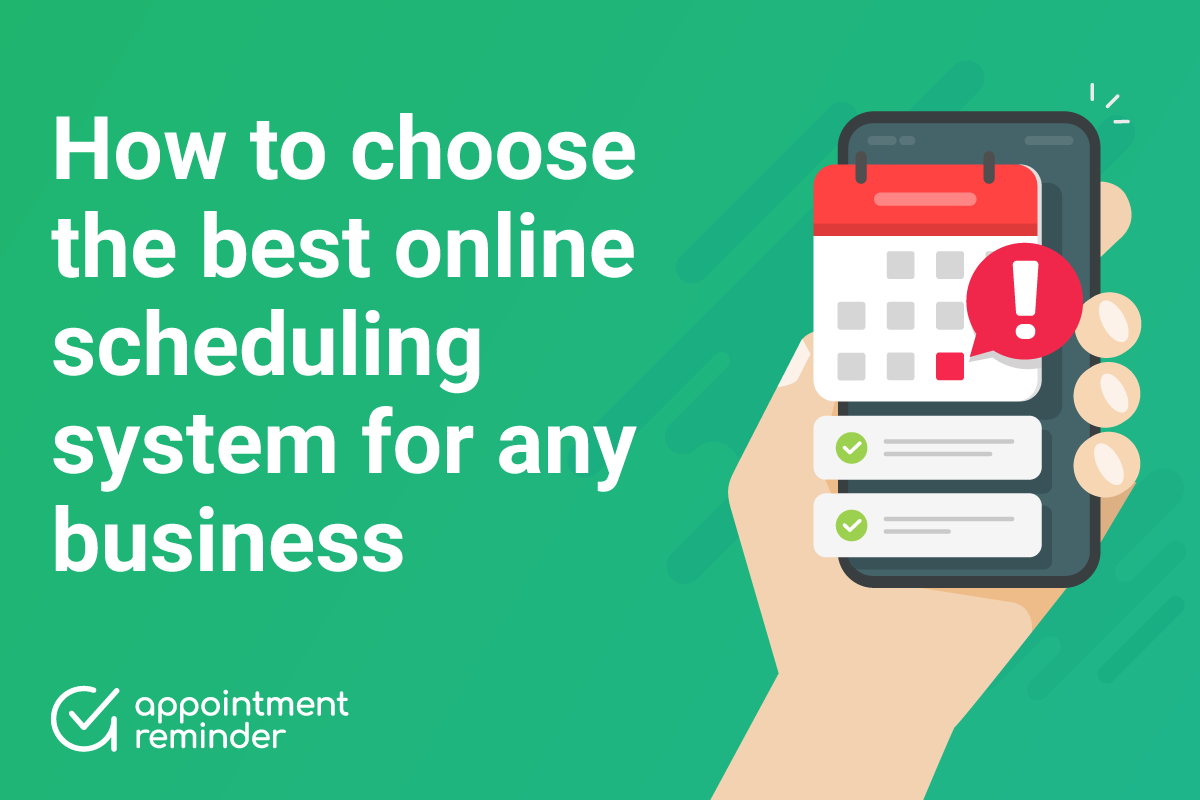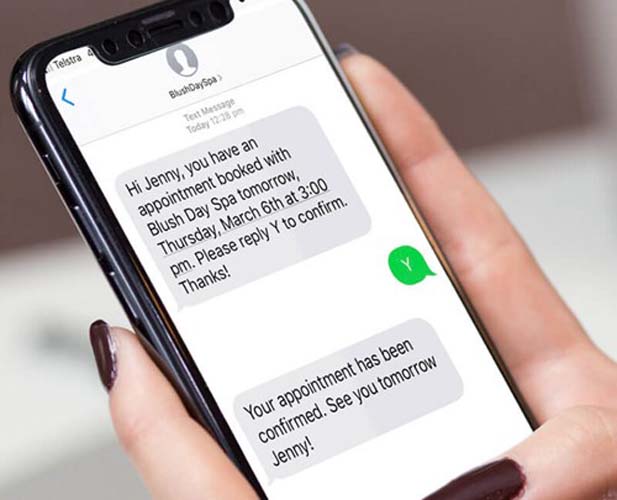

Whether you’re a personal trainer or the CEO of a large scale enterprise, chances are there’s a new scheduling software or app that could revolutionize the way you manage your time. Even if you’ve got an existing booking system – are you sure it’s the best one for you, your business and your customers?
Different leadership styles, company goals and workflow patterns will be drastically different from one business another, even if those two businesses are two personal trainers. It’s likely that the way one trainer interacts with their clients is completely different to the way the other trainer and is completely unique to you and the service you provide.
This is why it can be really hard to land on one perfect online booking system for your needs. Not only do you need to know that you can easily use it, your online scheduling software needs to reflect your business aesthetically, it needs to function in line with your business operations, and most importantly – it needs to meet the needs, habits and expectations of your customers. That’s a lot of requirements!
Further complicating the process is that many booking systems claim to achieve the same thing; they’ll automate simple tasks, freeing you up to spend more time on what’s really important, and increase productivity and ultimately revenue. While that’s true for all the scheduling software we review in this article…
Because you’re planning on having your business slot into what is essentially someone else's' (aka, the booking system), you’ll want to be absolutely confident it’s the right one. This will avoid having to migrate to a different system several years down the track when you realise it wasn’t able to support a restructure, or becomes financially unsustainable.
This article will help you not only compare some of the best online booking systems available, it’ll help you pinpoint exactly what your needs are in the context of online scheduling functionality.

All the booking systems reviewed in this article include the following features, although the comprehensiveness of each feature, how it works or whether it costs extra for example, varies from system to system.

Get really clear on what your business needs are and why you’re looking for online scheduling software in the first place. Do it even before you even read a review or sign up for a free trial!
One booking service might have thousands of five star reviews and all the bells and whistles you could imagine – but do you need to be paying for all those features? Are massage therapists giving it five stars whereas e-learning organisations give it a thumbs down? Would an alternative that offers less features for half the price be better suited?
The introductory videos and lists of features for each system will start to blur into one once you start comparing them and every review or testimonial is obviously written with a subjective lens too. But when you know what your business needs are in the context of booking software, you’ll be able to determine which products are contenders for your business a lot faster.
The questions below will help you determine how well suited each system is for your business model, your customers, and your bottom line.
Answering these questions or asking similar ones of your own will help you identify the things that make your business model or solo service unique to you, what’s essential and perhaps what you are and aren’t prepared to compromise on. Maybe you’ve discovered that the right scheduling software might be able help you streamline a process you hadn’t even thought of automating.

Most scheduling software will offer some form of trial, so you can always test it out and play around before committing to anything. Their pricing plans are usually based on one of the following variables; the number of appointments, the number of users, or the types of features. Some of them have free plans which usually involve limited features or restrictions such as ‘free for individuals.’
So whether you want to hire more staff, expand to new countries, or increase the number of bookings you receive, you’ll want to choose a software that will grow sustainably with your business goals to ensure you get the best value for money.
Each system offers some form of payment integration too like Paypal, Stripe or Square and these payment processing merchants charge fees on a per booking or % basis. This is usually additional to the software subscription cost.
You may find you’ll need to increase your pricing to reflect the additional expense of the software merchant fees, or you’ll find that your scheduling software saves you so much time and increases your bookings so dramatically that you’re in a position to duplicate or grow your business.
Bear in mind that once your business relies on an external booking system, your subscription may increase in cost over time or as new features are added, so ensure you have a strategy in place to manage potential price hikes.

There’s nothing like a global pandemic to force you to re-evaluate your business, pivot, or reinvent the wheel. In our increasingly fast-paced world, change is inevitable, and being flexible and agile is essential for businesses to not just survive, but thrive.
Could the scheduling software you choose open up alternative revenue streams for you? If you’re a hair salon rethinking your business model, is it important to offer direct debits as well as in-store items? If you’re a fitness instructor, do you need to rely on zoom integration to run live-streamed sessions?
Whether your goals are to strengthen your product offering, or streamline internal processes, you’ll want to be sure the new software can support you and your businesses long-term goals as well as the highs and lows of any year.

It’s essential that the booking system you choose works optimally for your customers and improves their overall experience with your business. Depending on your needs, you may be able to look at a demo site showing the booking system and make a decision right there and then!
However, while it would seem like one of the most important attributes to consider when selecting a booking system, these are B2B products, so their focus tends to be on how their system is going to better your business – not what it looks like from your customers point of view.
Because a lot of the systems offer similar functionality, we’ve highlighted which of these functionalities they make easy for you to use in our reviews, so that you can get a better sense of which industry or needs each system it geared towards. We’ve included the best demo links too, so you can quickly experience what it’s like to book an appointment or service as though you were a customer.
Calendly is best for: Scheduling and automating virtual and in-person meetings within a team. They give you two options; one-on-one or group meetings. Calendly is best for consultants or sales and marketing, education or recruitment teams who want to automate the scheduling of internal and external meetings, manage calendars from one place, and not have to worry about sending reminders or individual zoom links every time.
Calendly works best for individuals or teams that spend a lot of their day-to-day scheduling or in meetings, and want to avoid the email ping pong or phone tag. The interface is pretty simple too. It’s easy to set up and use and we’d recommend this software if taking a fee or payment isn’t important – though payment integration is a feature.
It’s great for your business if you offer different appointment types, which vary by time, ratio of clients:staff members and/or which staff member. Calendly is useful if you’re looking to sync yours or multiple peoples’ calendars to make scheduling and managing meetings or calls easier, want to manage all of them from one place.
Check out the creative ways some people have used Calendly, such as for organising a socially-distanced birthday party or teachers who need to manage education remotely.
Demo: Best example of Calendly in action
Not great for: Calendly doesn’t allow for a huge amount of customization. It doesn’t have a strong customer management system or reporting features.
Cool features: You can visually embed selected days directly into an email with a couple of clicks. If the person you’re scheduling a meeting with is also using calendly, they make it really easy to identify times you’re both free – making it a great option for busy teams.
Pricing: Basic $0 / Premium $8 / Pro $12
Pricing goes up based on the number of users and features are staggered per plan.
Trial: Free 14 day trial
Acuity is suitable for users in the fitness or wellness industry, particularly those that require customers to complete long or customized intake forms, surveys or agree to terms and conditions before completing their booking. The software is designed with customer retention in mind as you can offer payment packages, gift certificates, discounts and subscriptions.
If you’re relatively tech savvy, or already familiar with Squarespace, Acuity is a great option as the interface is similar. You can also automate daily or weekly agenda summaries for you and your team to prepare for their days.
Demo: Live examples of Acuity
Not great for: Companies that want all the bells and whistles of Acuity across multiple time zones. Unfortunately, many features become void if you need to juggle schedules across time zones.
Coolest feature: Acuity has a ‘make me look busy’ function to generate buzz. It’s also got a ‘minimize gaps’ feature which works by only showing clients time slots that are before or after existing appointments so that your work days can be scheduled more efficiently.
Pricing: $0 / $15 / $25 / $50 per month
Based on features and number of calendars (calendars = location/staff member)
Trial: Free 7 day trial
Best for: Large, professional organisations that need to automate the mass scheduling of initial screenings, delivery calls or meetings. OnceHub is best for consulting companies that want to increase pre-sales and better manage prospects among multiple staff. It’s good if your key resource is your people. If you need to control the length of time of meetings or the type of meeting you simply create multiple ‘events’ and set rules for each separate event e.g. is prior approval required before the booking is confirmed, which staff member takes priority, will it be in person or on zoom, or will it cost or be free?
OnceHub is set up to help you better manage prospects or candidates, sell packages or workshops and streamline the lead generation process through it’s professional interface. Automatic invoicing and reports are also well integrated into this powerful piece of scheduling software. Here’s an honest summary of OnceHub’s points of difference compared to other systems.
OnceHub is similar to Calendly in that it’s designed to eradicate email ping pong and phone tag, but with OnceHub you’ve got an added layer of control and customization. It would be well suited to large teams in the corporate, professional world such as online or in-person education, coaching, medical, recruitment or financial services.
Demo: How a OnceHub scheduling set-up looks
Not great for: If you’re looking for a client management system.
Coolest feature: Their support resources are genuinely good quality and easily accessible, as there are quick links all throughout the backend taking you to highly relevant support information.
Pricing: $15 p/m for up to 3 users / $10 p/m for 4-100 users / Discounts for teams of 101+
Based on number of users – all features are included, no matter what plan
Trial: Free 14 day trial
Best for: Small or medium enterprises, contractors or emerging entrepreneurs who want a simple landing page and booking platform combined that integrates well with social platforms. It allows you to define a range of services and customize each type. SimplyBook.me’s point of difference is that it starts out as a blank canvas, and you simply choose to enable features or not as you’re setting up. As a result, it really is suitable for nearly any type of service-based industry, particularly new businesses or start ups, or small teams and solo contractors who want the ability to easily add or remove features as they grow. SimplyBook.me has well integrated video tutorials and help throughout the backend too.
The plan you choose will depend on two things; the first is how many bookings you receive each month, and the second is the number of custom features you require. Some of these features defined as ‘custom’ might be as essential as accepting payments or the ability to add a widget to your website. Or it could be more unique and specific such as the ability to create and edit client intake forms, or offer coupon codes and gift cards.
SimplyBook.me is great for freelancers or entrepreneurs who need a professional but simple website and booking function. You can start with an existing template and when you’re ready to have your own custom website, simply install the booking widgets on your site. SimplyBook.me supports online payments with lots of payment processors and is designed to inspire customers to book recurring appointments, purchase products, memberships, packages, gift cards and leave feedback or reviews.
It has features to help with managing employee breaks and holidays, or resources like meeting rooms, chairs or locations.
Demo: SimplyBook.me client website examples from a range of industries
Not great for: A business that only does a few bookings per month but needs more than three features. It’s a little overwhelming to use to start with as it puts the choice to enable features in your hands, and the SMS reminders or notifications cost extra.
Coolest feature: SimplyBook.me is a booking system and website combined – you can select a template and have your schedule and website up and running in minutes.
Pricing: $0 / $9.90 / $29.90 / $59.90 per month (annual discount available)
Based on number of bookings you get (50, 100, 500, 2000 per month) and the number of custom features you use (1, 3, 8, unlimited). If you exceed the 2000 bookings per month, you need to purchase additional bookings and SMS credits are bought separately.
Trial: Free 14 day trial
Best for: Ideal for an organization or an individual that needs control and granularity in a single booking link for one-on-one meetings. It’s useful for individuals who have different appointment types and are expecting to be able to structure their booking system in a linear fashion. The user interface is very simple and intuitive, so Appointlet is recommended for people or businesses that aren’t particularly tech savvy (or have customers that need simplicity). Appointlet makes it easy for you to link a specific appointment type or staff member directly to a client or customer, so they’re not overwhelmed with an entire calendar month or appointment types.
The free version offers unlimited bookings, unlimited appointment types, virtual meeting integration and automatic booking notifications. If you need features like pooled availability, the ability to customize reminder and notification content or take payment, you’ll want to upgrade to the paid subscription.
While Appointlet definitely makes it easier for meetings and sales to happen faster, it’s also the best free online scheduling software for individuals or freelancers looking to simply virtualize their paper diary.
Demo: While there aren’t live demos, here are some case studies showing how Appointlet has help businesses in the legal, consulting, real estate, software and HR industries.
Not great for: Bookings that require groups of people.
Coolest feature: With tailored availability display, you can display a calendar with all team members availability or just select individuals.
Pricing: $0 or $8 per month (per user) (annual discount)
Based on number of users – all features included
Trial: 15 day free trial
Appointlet Integrations (shown in the footer)
Best for: Businesses where the variables that need controlling are the service type, the length of time, and then who is able to deliver that service. Setmore feels well designed for medical practice, beauty salons and e-learning. If you have a variety of ways that clients need to reserve time with your business, it lets you customize them with a different name e.g. Appointments might be retitled meetings, or ‘tutorial’ – depending on what you do.
It would be perfect for a company that has a central location where all activity occurs. If you’re a sole server who travels to meet clients in various locations, you can change the ‘provider’ to read ‘location’ as a simple and effective workaround. A one-click video meeting feature called Teleport, where up to five staff members can communicate on video call each other without the need to set up appointments or downloads, is also nicely integrated into the software.
One on one appointments can be set up for users to choose a service type and a provider to deliver the service, or you can enable ‘skip the staff’ for the next available person to be automatically selected on behalf of the client. On the other hand, classes are set up for one-off events or if you expect users to attend these sessions irregularly, as they must book them one at a time.
It’s quick and easy to view and filter your calendar schedule by provider, and add ad-hoc appointments to the schedule from the calendar view. You can code any appointment with a custom label such as ‘pending’, ‘confirmed’ ‘paid’ or ‘running late’ for an indication of client statuses at any time. Setmore is well suited to an organisation that wants to let staff see their colleagues calendars for better transparency across teams.
It has a clean interface that makes it easy to update the services, availability, break times or vacation for each individual, and is spotless from a customer point of view too. It also includes an app to use the software directly from your computer, instead of via a browser, so that all administration and management happens in one place.
Demo: See how Setmore works from a customer’s point of view.
Not great for: If you plan to grow to have significantly more than 20 staff, as the premium plan requires that you pay per calendar after the 21st person. While this is a little strange for a premium plan, it’s generous that their free plan offers 20 staff free – Setmore is best for businesses in that sweet spot of 20 staff or less.
Coolest feature: The ease of color coding and customized labels.
Pricing: $0 / $25 per month (includes annual discounts and add live phone booking or teleport functionality)
Based on number of users – all features included
Trial: Sign up to premium – if it doesn’t work in 30 days you can get a refund
Best for: Anyone already using Square payments as their POS, or hair salons, wellness providers and other client-facing service professionals who want an all-in-one solution. Square Appointments handles merchant processing, staff management, product inventory, client records, marketing features, payroll support and appointment deposits in one beautiful, easy-to-use app, optimized for iOs.
While they’re working on options for desktop/browsers, Square Appointments has definitely been set up to suit iPad or for staff members to manage on-the-go bookings and payments via their iPhone. Square Appointments is perfect for booth renters or mobile service providers.
It allows customers to store their card on file. It’s expected that you’ll take payment for a service once its complete, and that it will probably be in-person. You can also create a full-service custom website with Square Online Store.
Square Appointments is well designed for any service that operates similar to a beauty salon e.g. a client books themselves in for an appointment and can select add-ons prior to their booking, or products after their booking. It’s built with brick and mortar stores in mind, so great for the retail and hospitality industry.
Demo: Website demos aren’t available for Square Appointments, but this video shows what set up looks like for you, and how it appears to your customers.
Not great for for: Anyone needing a high level of customization or if you’re in a country where Square isn’t available (you’ll actually need to download the Square Point of Sale app from the App Store on your iOS device to access the backend during your trial).
Coolest feature: The fact it’s a website + booking software + POS system.
Cost: $0 for individuals* / $50 per month (5 staff) / $90 per month (10 staff)
*with % transaction fee
Based on number of users – all features included
Trial: Sign up for free (for one person)
All Square Appointments Features
Square Appointments Integrations (Instagram and Google)
Best for: Small businesses in sales, financial, non-profit or education industries that need online appointment scheduling services on user availability basis, or those who have unique integration needs; Bookafy has a massive range. The software routes appointments to a provider based on the skills and appointment types each team member can deliver. You can customize service start times so that certain appointment types are only available at 10am and 2pm, or ‘only on Wednesdays,’ for example. There’s also flexibility to schedule recurring appointments for customers as needed, e.g. every fortnight, every month, every year or whatever you need. Another unique and easy to use feature is how you can set up an appointment type and assign 2+ staff members – it could be useful for tradespeople who are wanting to manage their interns, or providers who require assistants, or for services that simply require two people.
As well as letting you view your calendar at a glance, Bookafy lets you view a staff member’s agenda for a given time period, and/or easily search for an upcoming appointment with that staff member by customer name. It also has a ‘book a one-off appointment’ button from the calendar screen, which assumes your business needs are such that you’ll be likely to create ad hoc appointments throughout the day on behalf of clients.
Bookafy includes practical and effective custom marketing message features too – you can send automated messages based on the type of service a customer had or based on when their last appointment was. It allows you to offer coupons and you can redirect your customers to a custom URL after they’ve booked.
Bookafy also scours the internet for your client or customer’s social profiles once they’ve booked an appointment; they share a screen link with you so you can get intel on your customer to ensure you’re able to tailor their booking with you. This is a useful, or totally irrelevant feature, depending on what your needs are.
Demo: Click the ‘book a live demo’ button from Bookafy’s homepage to view it in action.
Not great for: Anyone who needs to offer prepaid pricing options.
Coolest feature: You can enable a feature called ‘allow friend invite’ – not a popular capability as you’d think it would be in the world of online scheduling.
Pricing: $0 / $7 /$11
Based on number of users – all features included
Trial: Free 7 day trial
Best for: 10to8 is great for entrepreneurs, solo practitioners or contractors who are just starting out. This is because free version of 10to8 has most of the features of the paid version, with the most significant limitation being the maximum of 100 appointments per month. It’s optimised to allow you to take bookings on behalf of your clients and/or for them to book you, stay in touch with them and manage your teams calendars’ all in the same place.
When you sign up for your free trial with 10to8, you’ll be prompted to define your industry and booking type (e.g. online tutorials, wellness therapy, at home visits, sales and phone calls, student engagement, mentoring etc) which they use to personalise your account. You’ll find out pretty quickly whether 10to8 is going to suit your needs based on this drop down list.
When you’re setting up services, you’ll be asked to choose either a one-on-one service or a class type. You’re able to assign locations or rooms to a service or class (when you enable booking restrictions). You set up your staff, service types and general rules in one section, and then edit the online booking portal that your customers will see in a different section. The whole user interface is really friendly and intuitive. There’s also a built-in survey feature.
Demo: While we couldn’t unearth any live demos, their solutions page is incredibly comprehensive simply choose the best industry for you, and read their detailed outlines of how the software can mould to your specific case’s needs.
Not great for: Anyone who wants to register more than 99 people into a class – not suitable for large scale workshops or events.
Coolest feature: A two way chat between you and your customers, directly within the calendar. They’ve also created a Return on Investment calculator so that you can do some maths of your own to figure out if 10to8 is right for you.
Pricing: $0 / $9.60 / $20 / $40 / Unique
Based on number of users and appointments booked – all features included
Trial: 30 day trial

Hopefully you’ve been able to select a couple of systems you want to trial, or perhaps you’ve established that none of the products reviewed in this article solve the unique need you have. The good (and bad) news is that the world of online scheduling software is huge and ever-growing; the right option for your business exists – it might just take you some time to find it.
If what you’re looking for isn’t in this list, don’t be discouraged! Depending on how complicated your organisation or needs are, you may find that a product with responsive and outgoing tech support is all you need to help you establish a couple of simple workarounds.
If you don’t end up settling on a booking system from our top 10, we hope this article has given you some insight into what to look for in an online booking system as you move forward. Or at least that you now know what you don’t want in a booking system (it’s just as important!).
Your guide to testing and trialing online booking software as efficiently as possible
Finding the best online scheduling system for your business is about more than simply saving time and making money. It’s also about empowering your staff, strengthening your brand and building better relationships with your customers. It’s about creating meaningful experiences, more manageable lifestyles and ensuring that the system can grow alongside you and your organization.